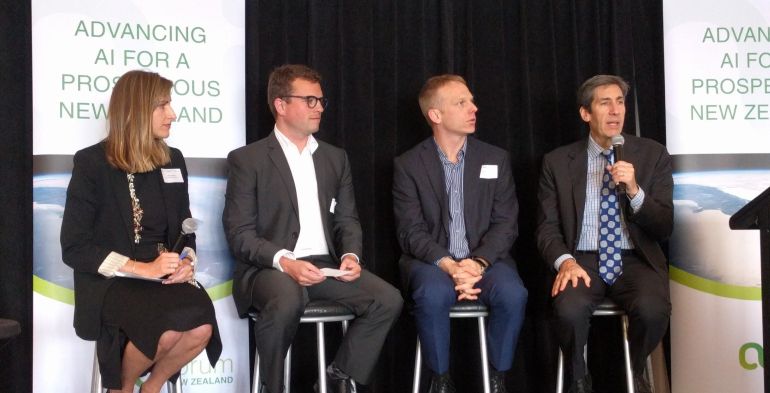Healthcare has rapidly become a key focus for the application of new artificial intelligence (AI) technologies. Alongside the opportunities, challenges surround its use in health, particularly balancing the use of data with privacy.
Last week, the AI Forum of New Zealand co-hosted a breakfast workshop with IAPPANZ and Microsoft to explore how AI can be used with health data to empower clinicians and improve outcomes, while still responsibly protecting patient privacy. Microsoft’s, Dave Heiner was joined by Waitemata District Health Board’s (DHB) Dylan Mordaunt and Kevin Ross of Orion Health and the Precision Driven Health Partnership.
While the promise of AI includes intelligent healthcare, Dave Heiner reiterated that AI does not replace human thinking. Instead, AI enables us to make better decisions. Dave is leading Microsoft’s AI ethical and legal considerations work, with a vision where machines and humans work together to enable greater societal progress. This ‘human centered’ approach will help create a future where machines augment and extend human abilities; vision, speech, language and knowledge.
Dave highlighted the importance of designing AI systems to earn trust. Systems need to be safe, reliable, designed for unexpected circumstances and tested extensively. To ensure AI is non-discriminatory, he made several recommendations; attract a diverse pool of AI talent, develop analytical techniques to detect and eliminate bias, create guidelines for AI developers to ensure systems are fair.
To ensure AI respects privacy, the panel agreed that clear controls are required. Individuals can then make choices about their data. Accountability needs to be established and AI systems must be transparent. In addressing automation, Dave said STEM learning should be strongly promoted in schools and lifelong digital skills training encouraged.
Kevin Ross joined the discussion on empowering data driven precision health. Health is becoming a data science with vast opportunities to include improve efficiency, access and outcomes. There are associated risks; unintended consequences, trust, naive thinking and systemic profiling, says Kevin.
The Precision Driven Health Research Partnership is building capability to optimise the health of individuals and their whanau by combining and learning from all available data. Kevin explained how this will improve health outcomes and increase health provider efficiency.
Ultimately, leadership is key, he says. Good governance and stewardship is required, alongside cementing the principles; people own their data and clinicians give advice. He acknowledged that mistakes will be made. However, healthcare should probably follow other areas, he advised. Healthcare operates in a domain where clinicians deal with risk, with or without data. For more on data driven health care, read Kevin’s insider’s view.
Further discussion included Dylan Mordaunt’s clinical perspective on social, population, health and economic impacts. The panel also considered the benefits and limitations of DHB’s privacy policies from an AI perspective and how health information should be treated differently than other types of data?
Want to know more? Sign up for the AI Forum NZ update, it’s free and will take less than a minute!






